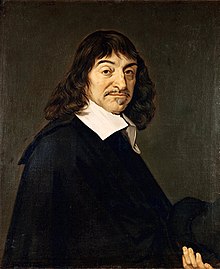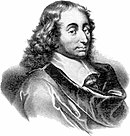French philosophy
The French philosophy is an important part of the philosophy of the West. From Petrus Abelardus in the Middle Ages to modern philosophy to existentialism , phenomenology and structuralism in the 20th century, she has repeatedly given impetus.
Renaissance
In France, too, one can only speak of a national identity of philosophy when it is tied to a nation state and tied to its own language around the time of the Renaissance . Prominent early representatives were Jean Bodin , an early thinker of constitutional law, as well as Michel de Montaigne , who with his essais introduced a new literary style into philosophy that is still effective today - especially in France. His subjects were people and morals.
Baroque
Descartes

René Descartes , who can be described as the founder of the philosophy of consciousness and rationalism , gave a fundamental impetus for philosophy in general . René Descartes is often considered the most important French philosopher at all, so the French often refer to themselves as "cartésien" (Cartesian). Descartes is originally a mathematician who founded the so-called analytic geometry . Based on his practice as a mathematician and his reflections on the mathematical way of working (in Reguluae ad directionem ingenii and in the Discours de la méthode ), he developed a new method that he summarized in four rules in the Discours.
Pascal
Blaise Pascal was also a first rate mathematician who developed the fundamentals of probability . In the Pensées, Pascal denied rationalism the ability to explain man's position in the world and contribute to peace of mind. For him this was only possible in a contemplative orientation towards faith.
enlightenment
The writer and astronomer Pierre Bayle , who created a widespread dictionary with the Dictionnaire historique et critique , Voltaire , with his writings against feudalism and absolutism ( Candide or optimism ) and against religious fanaticism ( Mahomet the Prophet ), Montesquieu as the founder of the separation of powers , the physician La Mettrie as a pioneer of materialism, the encyclopaedist Diderot , Condillac , who represented Lockean sensualism in France, and Rousseau , who was best known for the Bildungsroman Émile and the state-theoretical and religious-critical work Le Contrat social (= the social contract) , are the outstanding representatives of the French Enlightenment .
19th century
In the 19th century , Auguste Comte in particular had a significant impact as the founder of positivism and impetus for sociology . However, Émile Durkheim can be regarded as the real forefather of the empirical social sciences . The early socialist school of thought, which was becoming traditional for French philosophy, was represented by Henri de Saint-Simon , Charles Fourier and Pierre-Joseph Proudhon . In the areas of logic and epistemology, the outstanding mathematician Henri Poincaré and the physicist Pierre Duhem should be emphasized as the founders of conventionalism . Henri Bergson's philosophy of life had a great impact and continues to provide motifs for positions that deal critically with the rationality of modern society, especially in the concept of time of duration in contrast to the empirically analytical time as a sequence.
20th century
In the 20th century , French philosophy was strongly influenced by references to Edmund Husserl and Martin Heidegger , but also a new reception by Friedrich Nietzsche . Designated phenomenologists were Emmanuel Levinas , who developed a philosophy of others, is determined by the self ratio, as well as Paul Ricoeur , who worked out a comprehensive analysis of the will and besides influences on existentialism especially the hermeneutics made in France presentable. The focus of Merleau-Ponty's phenomenology was on studies of perception, corporeality, language and history. Alexandre Koyré combined phenomenology with the dialectic of Hegel and an existentialist view and was so formative for his student Jean-Paul Sartre , who based his concept of an atheistic existentialism on the basis of phenomenology . Like Sartre, Albert Camus was an existentialist writer.
Epistemology and History of Science
There is a specifically French tradition of historical epistemology , for which the names Gaston Bachelard and Georges Canguilhem stand alongside Koyré and Duhem . Althusser and Foucault later followed up on their work.
The influence of structuralism
In the second half of the last century a major impetus came for the French philosophy from the linguistics of de Ferdinand Saussure developed structuralism , a science-driven counter-concept to hermeneutics and linguistic analytical philosophy, which mainly used in the ethnological anthropology of Claude Levi-Strauss found . The psychoanalyst Jacques Lacan , who radicalized Freud and also saw a symbolic structure in the unconscious , took over concepts from Saussure and Roman Jakobson and reinterprets them. Louis Althusser , who is also important as a teacher of Foucault, subjected the texts of Marx to structuralist reading as an important exponent of Marxist theory. He contributed to the theory of ideology .
Post-structuralism
Above all, structuralism is the point of reference for poststructuralism , which turns away from the abstract and ahistorical study of language. One of the founders of this movement is Jacques Derrida , who was strongly influenced by Georges Bataille and Maurice Blanchot . Derrida's strategy of deconstruction is based on an expanded understanding of text as a general context of reference. It follows the reversal and shift of the oppositions that structure metaphysics . When reading texts (in the narrower sense) she proceeds with "evenly floating attention" (Freud), ie she is not only interested in the course of the argument, but also in seemingly irrelevant things that contradict the official thesis of a text, so to speak. The result of the investigation, as in hermeneutics, is never complete; In contrast to hermeneutics, the point is not to reduce a text to what it 'wants' to say.
Roland Barthes , who is considered to be the co-founder of semiology, used deconstruction in the fields of film and fashion. Jean Baudrillard mainly dealt with questions of modern media, cyberspace, fundamentalism and globalization.
Foucault
Alongside Derrida, Michel Foucault was one of the defining figures in modern French philosophy. He too is assigned to post-structuralism, but also to post-modernism . One of his key terms is the discourse , by which he understood society's linguistic regulation for specific issues. A normative power emanates from such a discourse, which often culminates in the exclusion and disadvantage of minorities such as asylum seekers, the mentally ill or prisoners. Foucault also saw such an exclusionary discourse in the philosophy of reason and rationality. B. due to non-rational behavior turns the fool of the Middle Ages into a mentally ill person who is no longer in the middle of society, but is kept away from society in a special institution. Gilles Deleuze was friends with Foucault and has no phenomenological or structural background. As a critic of rationalism, he dealt intensively with Nietzsche and, together with Félix Guattari, published works on “Capitalism and Schizophrenia”. The term postmodernism was actually coined by Jean-Francois Lyotard , who campaigned for the recognition of radical social pluralism. Other representatives of postmodernism include André Glucksmann , Bernard-Henri Lévy , Luce Irigaray , Julia Kristeva and Jean-Luc Nancy .
Institutions
In France, philosophy benefits from a strong institutional base. In France, for example, every student has to complete one year of philosophy lessons in the "terminale", the last year before graduation . In Germany the teaching of philosophy has only established itself as a "substitute subject" for religion in recent years. At an advanced level, philosophy is not only taught at universities, but also e.g. B. also at the École normal supérieure and the École des Hautes Études en Sciences Sociales , where Derrida taught, and at specially founded institutions such as the Collège international de philosophie . Scientists from other disciplines such as B. Claude Lévi-Strauss and Pierre Bourdieu had a philosophical education, which facilitates transdisciplinary communication.
Dealing with psychoanalysis
An important feature of French philosophy in the 20th century is the very intensive study of psychoanalysis . This applies to philosophers as diverse as Althusser, Cornelius Castoriadis , Derrida, Foucault, Deleuze, Paul Ricœur , Luce Irigaray and others. a.
literature
- Vincent Descombes : The Same and the Other. Forty-five years of philosophy in France (1933-1978) , Frankfurt am Main, Suhrkamp, 1982
- French Philosophy in the 20th Century: An Author's Handbook , ed. by Thomas Bedorf and Kurt Röttgers , Darmstadt: Wissenschaftliche Buchgesellschaft, 2009, ISBN 3534205510
